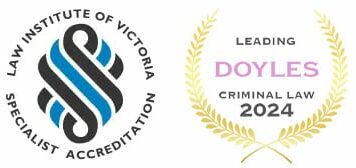Expert Traffic Lawyers in Melbourne
If facing a road traffic offence, it is essential that you engage expert legal advice at the earliest opportunity.
Traffic offences cover a broad range of charges. Common examples include careless driving and low-level drink-driving. Whilst serious examples culpable driving causing death and dangerous driving causing death or serious injury. Exposing emergency workers to danger by driving is a relatively new traffic offence.
A traffic offence will often require a close technical analysis by your legal representatives and other experts engaged by our
firm. Our team is best placed to advance all available defences on your behalf in this complex field of criminal law.
For advice from experienced criminal defence lawyers, contact Slades & Parsons today. Our Melbourne CBD-based law firm has been defending criminal charges for more than 35 years.
Dangerous Driving Causing Serious Injury
More serious traffic offences, such as dangerous driving causing serious injury, demand careful forensic scrutiny from the outset. Individuals facing offences such as this will face lengthy terms of imprisonment if convicted.
Contact Us Today
Contact Slades & Parsons for help in navigating the legal process on traffic offences. We’ll be back in touch shortly.
Drink and Drug Driving Offences
There are numerous charges which broadly fall under the bracket of drink and drug driving offences. These include:
- Driving whilst exceeding the prescribed concentration of alcohol
- Exceeding the prescribed concentration of alcohol within three hours of driving
- Driving under the influence of alcohol
- Driving whilst exceeding the prescribed concentration of alcohol
- Driving whilst impaired by drugs
- Refusing to undergo preliminary breath-test
- Refusing to undergo a drug impairment test
There are very slight technical variations to each charge. For example, driving whilst impaired by a drug is a more
serious offence than exceeding a prescribed concentration of a drug.
Similarly, driving under the influence of alcohol is more serious than driving whilst exceeding the prescribed concentration of
alcohol.
There are additional procedural steps that the police must take in charging and prosecuting a person with these more
serious offences. For example, to prove that you are guilty of driving whilst impaired by a drug, a formal impairment assessment must have been conducted by police.
The subtle technical differences between these charges can make all the difference in how best to approach your defence. Ultimately, a successfully run technical defence can spare you significant court-imposed penalties. This includes
imprisonment, as well as long-term licence disqualification periods.
Case Study - Traffic Offences
Slades & Parsons recently represented a truck-driver charged with dangerous driving causing serious injury. He was driving his truck on a freeway in the morning. Traffic was heavy and could be described as ‘stop-start’.
It was alleged that he had failed to notice that the traffic had stopped before colliding into three cars in front of him. It was
also alleged he was:
– travelling at a speed of approximately 70km/hr (under the
speed limit), and
– that he had not braked at any time prior to the collision.
There was further evidence from his call charge records and an
eye witness that he may have leaned over to his passenger seat to attend to a phone call moments before the collision.
The collision tragically caused very serious injuries to one of the drivers of the three cars in front.
This was a hard-fought matter, in which an experienced barrister represented our client at a committal hearing. We were able to challenge the relevance of the evidence of the call charge records. We successfully argued that his having received a call did not mean that he had answered it, nor that he had been distracted by it.
Crucially, we were able to overcome the account of the eye witness. They conceded under cross-examination that our client’s leaning over was consistent with him checking his side mirror whilst changing lanes or viewing the traffic behind his vehicle. The evidence that remained against our client was insufficient to commit him to trial.
Although it was conceded that he had failed to brake in time to avoid the collision, at no point had he exceeded the speed limit. His conduct only amounted to the much less serious summary offence of careless driving, to which our client pleaded guilty. He received a modest financial penalty, and thus avoided a lengthy jail term.
Slades & Parsons are available to take your call 24 hours a day.
Our experienced criminal lawyers can provide more information on traffic offences and help in navigating the legal process.

